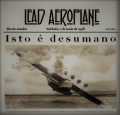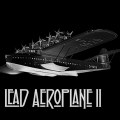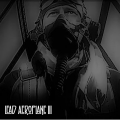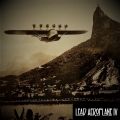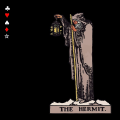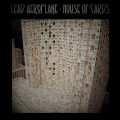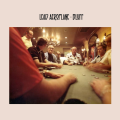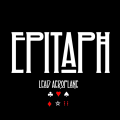Lead Aeroplane
| This article is a proposal
|
Lead Aeroplane was an English Zone Rock band from London, famous for its aggressive guitar-driven sound, powerful beat, and flamboyant vocalist.
Personnel
All members have had nicknames based on playing card suits since mid-1974:
♥ (Hearts, aka Gracie Lyn Plant): lead vocal and occasionally harmonica. major lyricist of the band, as well as its frontwoman.
♣ (Clubs, aka James Patrick Balin): lead electric and acoustic guitars, occasionally other string instruments such as tar, mandolin and Portuguese guitar among many others. major music composer of the band, co-leader of the band.
♠ (Spades, aka Paul Lorin Jones): bass, violin and backing vocals. live, he would usually alternate between the two instruments, depending on whichever one was more necessary; live musician Rhoberth Martinez would contribute bass whenever Jones was busy with the violin.
♦ (Diamonds, aka John Henry Spence): drums and assorted percussion.
☆ (The Joker, aka Jimmy Casady): rhythm guitar and occasionally acoustic guitar, theremin and live bass. also backing vocals. As the fifth member to join the band, he picked a five-pointed star symbol, representing The Joker playing card.
⚅ (Domino, aka John Paul Gorman): keyboards (mostly Orchestron and occasionally piano, harmonium, clavinet and clavioline). last member to join the band. only member represented by a domino symbol.
Guest musicians
John Paul Gorman participated in the band as a guest since 1974, playing keyboards both in studio and live. In the album The Hermit, two members from Tyrean Yesman participated; Ioan ffeil Donal played flute in the intro of Causeway to Eden track and John Anderson made a duet with Gracie Plant in The Battle of Five Armies track.
Dornburg Aeroplane
Balin, Jones and Spence already knew each other from high school when they formed a blues band in 1969, initially called Dornburg Aeroplane, named after the Dornburg Disaster. They started to look for a vocalist, as none of them seemed to sing well enough. Spence introduced to the band a girl who was known at school as an ostracized shy person, Gracie Lyn Plant. No one else was initially interested but gave her a chance anyway, not because they particularly liked her contralto voice but because they didn't have any other candidate.
The first two concerts were complete fiascos. Gracie Plant suffered from stage fright and couldn’t sing. Most of the band wanted to get rid of Gracie Plant, while Balin (who might have had a crush on her at the time) defended her. He suggested that she drink alcohol or eat peyote before performing; this appeared to solve the problem. In their third concert, Gracie Plant seemed like a totally different person, leaving both the audience and the band astonished by her performance. A fifth element joined the band early 1970, Jimmy Casady at rhythm guitar.
In time, after several concerts in the region, Dornburg Aeroplane became a well-known band, and audiences started to grow. After performing others’ compositions in night clubs, the band tried their luck with original songs, of which they sent a demo to an independent record label (Atlantis) in 1970.
Lead Aeroplane
The blues period
The record label found interest in the Dornburg Aeroplane blues sound, and the band signed a contract to record an album on the condition that they drop the band’s name, fearing future troubles with relatives from Dornburg Disaster victims. After plenty of discussion, "Lead Aeroplane" was chosen as suggested by Spence.
In early 1971, the band now known as Lead Aeroplane launched a self-titled album that was well received by the critics and sold reasonably well. Its sleeve showed the famous crash of the Dornburg Db-VI in 1938, taken from brazilian Jornal do Brasil newspaper. A musical magazine said of Gracie Plant's performance, just like she was giving birth of a son through her heart. This critic would be the origin of her future nickname.
Lead Aeroplane then toured across England increasing their number of fans, especially among the Zonees. They soon became famous for Balin’s aggressive guitar sound (sometimes played with a violin bow) with long improvisations, Spence’s powerful drumming and Gracie Plant’s voice and increasingly flamboyant performances under the influence of absinthe. Some musical press called them the English Thankful Dead due to their long guitar jams. Once, Lead Aeroplane opened a The Rockmen concert, and, after improvising for too long, they were warned they could only play one last song. And so, they did, stretching a song that was originally five minutes long to last half an hour. This became a staple of Lead Aeroplane concerts.
Lead Aeroplane II and III were launched in 1972 and 1973 respectively. These were still deeply blues rooted albums which were well received by the critics and sold well. This caught the attention of major record labels, as Lead Aeroplane was now quite a well-known name from the English rock scene. Lead Aeroplane III included some of their most well-known singles, notably White Rabbit (which introduced Alice's Adventures in Wonderland to Zone Rock movement) and It’s Been a Long Time (a classic rock song parodying Elvis Pressler). It was followed by Lead Aroplane IV in early 1974, which was the maturation of Lead Aeroplane’s sound according to contemporary critics.
The folk period
Intending to reform the band’s sound, Lead Aeroplane started to change its style, shifting to folk roots during 1973-74 along with other folk-influenced zone rock bands, notably Jethro’s Tuil and Exodus. During these years, performances included several folk-influenced songs themed around fantasy worlds that differed often from concert to concert; they were provisional versions of some of their future successes and now only preserved in bootlegs.
In mid-1974, Lead Aeroplane left Atlantis Records and signed a contract with American Phonograph Company (a major record label and a subsidiary of American Broadcasting Corporation) in a time the music industry could no longer ignore the potential of the zone rock market. The band then launched the final versions of some of the songs on which the band was working during the previous two years. With the change of style, The Hermit took critics by surprise as it was an anonymous record released just three months after Lead Aeroplane IV. It received extremely complimentary reviews and was a great commercial success, rivaling NoMoreEagleZ's self-titled debut album as best album of the year 1974. This secured Lead Aeroplane's position as one of the frontline zone rock bands in the world.
No member of the band had their name anywhere on the record, and from then on, each member was referred to by a playing card suit, as all members enjoyed playing cards. Even the band’s name was omitted, not appearing anywhere on the record or its cover, as if they were a brand-new band. Among the songs, there was the anthemic Causeway to Eden, a crescendo song that became the most famous Lead Aerplane song and one of the defining songs of Zone Rock.
Their first world tour soon followed, full of sold-out concerts across FK, continental Europe, and North America. On their return they started to work in their next album while in refuge in a cottage that was turned into a recording studio in deep rural England. As a result, the sixth album came out in early 1976, called House of Cards. As too many songs were recorded for a single album, it turned into a double album. Its cover depicted skyscrapers made of playing cards, a metaphor to the social and economic fragility of society. The album was crowned by a Persian-influenced long track, Persepolis, which had the participation of a group of ten kamancheh Persian players.
Despite not being as much well received by the critics as The Hermit, it was a commercial success. Another world tour promoted the new work for nearly a year, ending in mid-1977. On their return, Gracie Plant’s health deteriorated due to continuous consumption of absinthe. Meanwhile, a live album being the soundtrack of a homonymous movie, Bleed Aeroplane, was released during late 1977.
The keyboard period
In late 1977, a new member joined Lead Aeroplane. Keyboard player John Paul Gorman, who picked the symbol ⚅ as sixth member of the band, had already participated in recording albums since 1974 and followed the band as a live musician during the 1976-77 world tour. With him, Lead Aeroplane’s sound changed once again, now adding keyboards to their aggressive style. Due to Gracie Plant’s health, the new record was delayed until early 1978. Their seventh album, called Bluff, received mixed, although in general warm, critical reviews. At the time, critics saw Bluff as an approach to Pink Frojt style (among many other zone rock acts) due to the use of instruments such as piano, organ and Orchestron without being too elaborate. Also, fans felt divided about this unusually softer approach to rock by the band.
A new world tour was programmed for 1979-80 ending at the upcoming Canterbury Rock Festival, where second day would have been headlined by Lead Aeroplane, but Gracie Plant’s health continued to deteriorate.
The end
The band was forced to cancel their world tour, and Gracie Plant finally passed away of cirrhosis, on the 25th of August 1979. Her death was communicated by the band and left their fans and the zonees in general in shock. During the next week, Lead Aeroplane announced their dissolution, agreeing that there was no reason to continue without the voice of the band, no one was able to replace The Hearts.
At the Canterbury Rock Festival, Lead Aeroplane was replaced by Pink Frojt as second day headliner. But somehow, Lead Aeroplane’s music was present, as several of the most acknowledged Zone rock characters gathered in a tribute superband called The AeroplaneZ and played some of the most famous songs during an hour-long concert. Tyrean Yesman’s John Anderson (the man with an almost female voice replaced the woman with an almost male voice). The AeroplaneZ included also members from Pink Frojt, NoNoreEagleZ, Tezla Generator and Jethro’s Tool.
The last Lead Aeroplane album, Epitaph, was released in 1981 and included outtake songs from the last four records. Lead Aeroplane gathered again only once for a one-off reunion (in 1984). The band played the music and an enthusiastic audience replaced the Hearts. Some of the songs were played by its members in their following solo careers over the years.
Legacy
Lead Aeroplane are widely considered as one of the most successful, innovative, and influential zone rock bands. They were a major (if not the major) influence in the birth of Hair Metal during early 1980’s.
They were the fourth best-selling zone rock band, after NoMoreEagleZ, Los Muartos Agrayeçyos, and Pink Frojt. Several musical magazines ranked Gracie Plant as the best zone rock female vocalist, James Balin as best guitar player, and John Spence as best drummer. Paul Lorin Jones is considered one of the best bassists of zone rock scene. No other zone rock band has so many number ones. In 2016, celebrating the 50th anniversary of the book Zones Old and New, musical magazine Skweee! ranked the 100 best zone rock albums. All studio albums, except Bluff and Epitaph, were among them. Only NoMoreEagleZ had more albums in the list.



